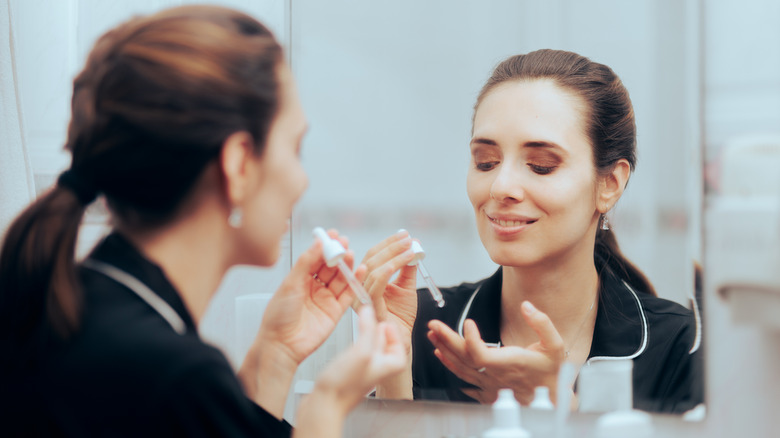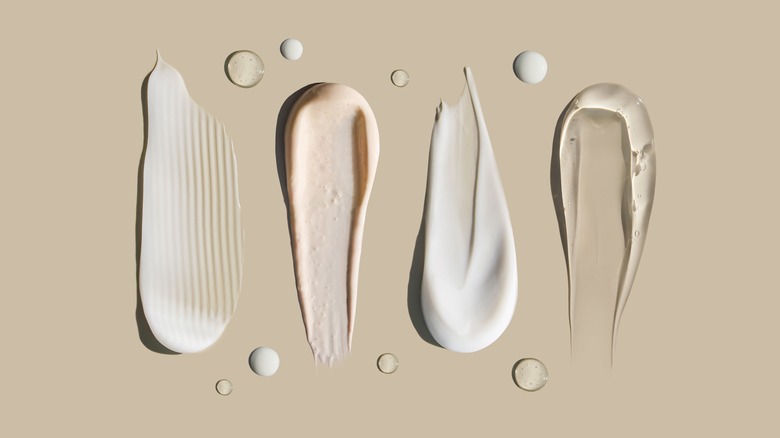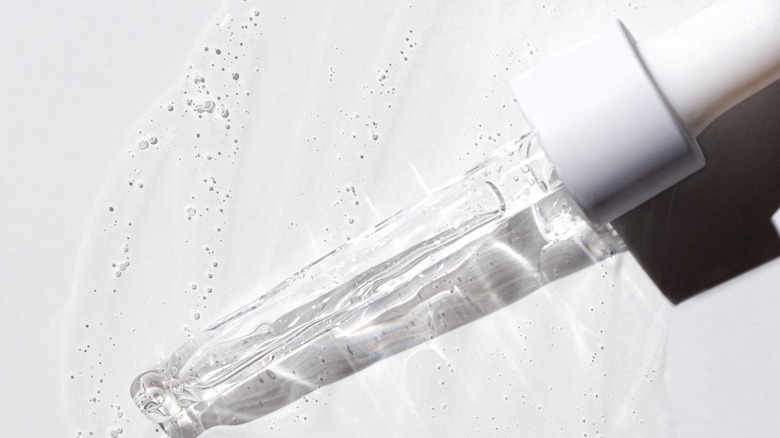Is Retinol Cream Or Serum More Effective?
We may receive a commission on purchases made from links.
There's no such thing as liquid gold in skin care, an ingredient that would magically take care of all your blemishes, but there's something close: retinol.
In recent years, there's much fanfare over retinol, as it's touted to deliver a long list of benefits, including faster skin cell turnover, anti-aging effects, skin brightening, expedited collagen production, and acne reduction. "Retinol refers to a type of retinoid or vitamin A derivative that's available over-the-counter," Dr. Marisa Garshick told Marie Claire. "It's a key ingredient when it comes to skin aging and has scientific support that it helps to boost collagen and improve the appearance of fine lines, wrinkles, and brown spots."
Given the many advantages retinol can have on the skin, it's not surprising that a litany of products now features this hero ingredient. There's no shortage of creams and serums on the market with retinol content, so it's something that's definitely accessible. But as it turns out, like most skincare products, the consistency of your retinol determines the outcome. You can't just arbitrarily pick a serum or cream just because.
Retinol cream vs serum: is one better than the other?
Retinol is a powerful ingredient no matter what product it's in, but according to board-certified dermatologist Dr. Susan Van Dyke, serums have more retinol concentrate due to their light consistency, per Bustle. Meanwhile, Dr. Orit Markowitz noted that creams are better because they "actually create a skin barrier that prevents moisture loss."
Now, what does this imply? Since retinol serums have higher concentrations of the ingredient, it may be the "better" option if you want to maximize the benefits. Then again, dermatologist Dr. Janet Prystowsky explained to Dermstore that serums "penetrate the skin faster and easier" because there are hardly any additional ingredients mixed in, meaning you may experience more redness and peeling. Board-certified dermatologist Dr. Sonia Batra then recommends starting off with a lower percentage until your skin builds tolerance, per Oprah. Meanwhile, since creams are on the thicker side, they're often formulated with ingredients that deliver moisture, so using them also reduces the chances of irritation.
It's worth noting, however, that retinol, regardless of if you're using a cream or serum, should be used with caution. Dr. Rina Allawh recommends doing hacks like "shorter contact time (such as applying at dinner and washing off at bedtime), mixing with a nighttime non-comedogenic moisturizer, and starting use at one-to-two nights weekly and increasing to nightly as tolerated" (via Skin Wellness).
Choosing retinol based on your skin type
Selecting a retinol product also depends on your skin type, per Dr. Mary Ann Mikhail, a fellow of the American Academy of Dermatology. Speaking with Byrdie, she noted that gels and sprays are "more drying," while lotions, serums, and creams "are more hydrating".
If you have oily skin, she recommends using a gel or spray variant, while those with combination skin may appreciate using a lotion or serum more. On the flip side, creams are best for those with dry skin. Climate could be a crucial factor in your choice of retinol product, too. "You might need a cream in the cold and something lighter in warm, humid weather," she added.
The amount of retinol in a product also matters. "Percentages of as little as 0.01[%]retinol are proven to be effective at improving multiple signs of aging, reducing pore size and overall improving the health of your skin, when used consistently," Paula Begoun of Paula's Choice told Get the Gloss. If your goal is evening your skin tone and improving texture, as high as 0.4[%] is ideal, while reducing the appearance of wrinkles requires a higher percentage, in the neighborhood of 0.5 to 1 percent. Just be sure to avoid using a higher concentration from the start so you can give your skin time to adjust to the ingredient. Working your way up is still the best way to approach retinol use.


